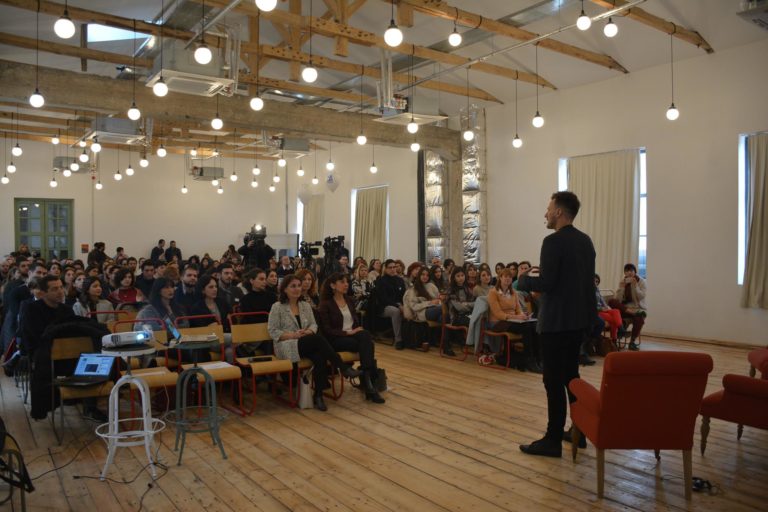By Katie Ruth Davies for Georgia Today, November 28, 2016
The Center for Strategic Research and Development of Georgia (CSRDG), in cooperation with Nadacia Pontis and with the financial support of International Visegrad Fund, invited Georgian businesspersons, students and media representatives to attend a lecture by Thomas Kolster, a leading international expert in sustainable communication and non-profit marketing, author of the book “Goodvertising.”
Kolster has been dubbed an “Inspirational Leader” in the field, and, having attended his lecture, I would agree.
Kolster started his two-hour talk by reflecting on his own childhood, spent on an island in the Baltic Sea off the coast of Denmark, where the job prospects for local youth included just fishing, farming, priesthood, or school teaching. When the fishing industry “dried up” those of Thomas’ peers who had trained for this particular profession were left adrift. From this, he learned to think “out of the box.” Going in a totally different direction, Kolster chose advertising, in which he worked for over ten years. But, wanting to make a difference and make a mark, it was the COP15 (Conference of the Parties) which took place in Copenhagen in 2009, and the “empty promises” of the politicians and big companies to make the necessary changes for the better, that really opened his eyes to the potential power of brands to be used for the greater good.
Kolster presented a number of good examples where big brands had taken their wealth and used their advertising strength to make a difference in the lives of their consumers.
One example was the Pepsi Super Bowl “boycott,” whereby Pepsi took the USD 20 mln it normally spent on creating an advertising campaign during the US Super Bowl and instead turned it back on the people- first asking citizens what projects they would spend the money on and then funding a huge number of those projects. Given a choice between “do-good” philanthropic Pepsi and its rival brand, people that year chose Pepsi.
In a product slump, deodorant brand Axe decided to focus on the issue of social responsibility in its #biggerthansuicide campaign- turning people’s attention to the fact that they were using social media to discuss numerous insignificant daily issues and ignoring those that really affected people’s lives- in this case male suicide. Sales of Axe shot up and male suicide in the UK got 45 percent more attention than it had prior to the campaign.
Like the example of Pepsi, with Axe, Kolster demonstrated the power of big brands to do something good for society and to reap the financial benefits.
“In 2011, the CEO of Puma, Justin Tallis, during his annual report extolling the growth and successes of the company throughout the year, turned around at the end and said: ‘We, PUMA, the company, have ruined the environment for EUR 145 mln,’” Kolster told us. For a time thereafter, PUMA shoes were sold with oversized labels clearly marking the cost of damage (water, air, land use, waste, etc.) that had gone into the making of the product. “What you cannot measure, you cannot change- if you don’t know the impact your company has, you cannot change it,” Tallis said in support of the accountability campaign.
In this increasingly transparent world, one in which urban living generates pollution and stress, where all are expected to be accountable for their actions and people actively seek a better, simpler life, the trend is for people to appreciate when they are given the chance to choose a socially responsible brand. This can be seen in the rising global popularity of organic and biodegradable products, for example.
Five factors, Kolster says, need to be taken into account by a company when deciding how to advertise and how to make an impact through advertising:
1. Urbanization- more people moving into the cities (traffic jams, increased housing prices, etc.);
2. Demography- an aging population (requiring product adaptation);
3. Resources- climate change and scarcity;
4. Economic Shifts- changing wealth distribution within societies;
5. Digitalization- mobile phone and internet use over print media.
What do these factors mean for companies and brands? It’s time, Kolster says, to think about what people want or need in their daily lives, not just the product you need to sell.
In terms of applying this to Georgia, the first company that springs to mind is Geocell, with its popular Movla (Care) campaign against littering (and clearing up areas where litter has already been dropped).
Other Georgian or Georgia-based companies also run CSR projects- donating to charity, running internal “green” policies, holding fund-raisers, with various advertising campaigns- usually soft ones- to advertise the fact. But what Kolster taught those present was that these acts can be magnified, and used in advertising; that “goodvertising” can be used as an effective tool for increasing revenue while also making a sustainable difference to the society- and global environment- in which our businesses operate.
The lecture was organized in the frames of the international project: ‘Enhancing Sustainability and Engagement of Civil Society in EaP and V4 Region through a CSR Agenda.’ The project is being implemented in six countries (Slovakia, Czech Republic, Hungary, Poland, Georgia and Belarus).


